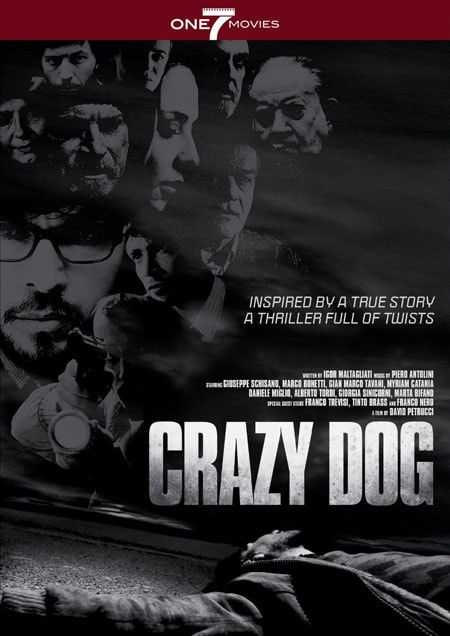Supposedly-but not really-based on a true story, Crazy Dog, or Cannepazzo, details how Marco seeks to uncover the truth behind the identity of the titular serial kiler who murdered his father twenty years before, despite the killer being known to have committed suicide, which suggests that the truth has already been somewhat uncovered. His investigation takes the form of an interview of Raul Chinna, a famous criminologist. Chinna tells Marco about an (ironically) unreported aspect of the case, namely the investigation into the of murders by a reporter (there's the irony) called David Moiraghi. As the interview continues, we discover more about David, as well as Marco's father, and, ultimately, Chinna himself.
This film exists very much at the periphery of the giallo. Peripheral pretty much sums it up on many levels: the audience are peripheral figures, as we watch one man tell another about the activities of a third man from twenty years before. Flashbacks-within-flashbacks abound. The slick style, probably one borne out of the necessity of masking budget deficiencies, also keeps us at a distance, as the film jumps about manically without stopping to breathe. This isn't necessarily a bad thing, as it's not a good enough film to be improved much by more breathing room (as such, it should probably be humanely put down by suffocation).
By contrast, the central investigation is so central that it has two distinct layers. The superficially 'main' investigation is that of Marco, out to (re)uncover the truth behind his father's murder. However, as stated, this investigation proves to be nothing more than sitting and listening to another character speak. David, the reporter of whom Chinna speaks, conducts the second, and in many ways only true, investigation, which takes up much of the screen time but is in fact extremely lacking in terms of detective logic. The only investigative breakthrough comes thanks to some wild extrapolating from David based off a newspaper report of a missing veterinarian, from which he surmises that the killer has based himself at an abandoned location where the vet used to perform experiments on animals. Hence the killer's self-awarded title, Crazy Dog.
The investigation is so prosaic that David doesn't even manage to uncover the connection between Crazy Dog's first eighteen victims (one of whom is Marco's father) himself; instead he gets essentially kidnapped, and the connection is laid out for him by the kidnapper. As with much of the film, the plot strand of David's kidnapping doesn't really stand up to scrutiny in terms of logic and motivation. The main purpose seems to be to distract the viewer from what's really going on. This could be said to be the intent behind much of the goings-on in gialli over the years, but here the leaps of logic come across as annoying and distancing, rather than being charming and eccentric.
I won't spoil the ending, with its twin revelations, but I will say that I guessed them both extremely early on. The twists are big, so big that they overwhelm what's come before, and are far from satisfying (and are very similar to each other). So that's pretty much it: a poor, predictable film noteworthy only for its cameos and its peripheral association with a once-burgeoning Italian filone. The first 70-odd minutes is rendered redundant by the end revelations, and doesn't possess enough style or excitement to have made the slog through them worthwhile. The characterisation is OK in spots, as is the acting (Nero goes way OTT, and is saddled with ridiculous dialogue, but is still magnetic), but there's nothing about this film that will live long in the memory after watching it.
|
|
But wait-could there be a third twist, buried right towards the beginning of the film, long since forgotten when the final reel revelations occur? Chinna tells Marco that his interest in the case has been sparked by "curiosity, coincidences, similarities." Consider the film's ending in the light of this line, and you may end up reevaluating certain conclusions which have been formed by certain characters. Or you may not give a shit, and just want to forget the rest of the film, along with the aforementioned line of dialogue. It's up to you.
|

 RSS Feed
RSS Feed
